
The City of Maroondah is a local government area in Victoria, Australia in the eastern suburbs of Melbourne. Maroondah had a population of 115,043 in August 2021.

Wentworthville is a suburb in Sydney, in the state of New South Wales, Australia. Wentworthville is located 27 kilometres west of the Sydney central business district and is part of the Greater Western Sydney region. Wentworthville is split between the local government areas of the City of Parramatta and the Cumberland Council. Wentworthville is colloquially known as 'Wenty'.
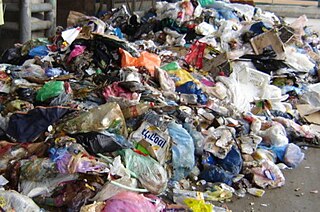
Municipal solid waste (MSW), commonly known as trash or garbage in the United States and rubbish in Britain, is a waste type consisting of everyday items that are discarded by the public. "Garbage" can also refer specifically to food waste, as in a garbage disposal; the two are sometimes collected separately. In the European Union, the semantic definition is 'mixed municipal waste,' given waste code 20 03 01 in the European Waste Catalog. Although the waste may originate from a number of sources that has nothing to do with a municipality, the traditional role of municipalities in collecting and managing these kinds of waste have produced the particular etymology 'municipal.'
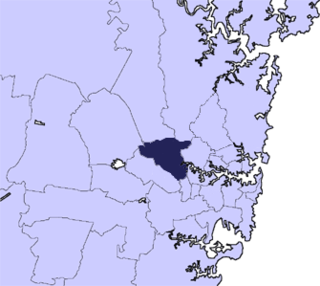
The City of Parramatta, also known as Parramatta Council, is a local government area located to the west and north-west of Sydney CBD in the Greater Western Sydney region. Parramatta Council is situated between the City of Ryde and Cumberland, where the Cumberland Plain meets the Hornsby Plateau, approximately 25 kilometres (16 mi) west of the Sydney central business district, in New South Wales, Australia. The city occupies an area of 84 square kilometres (32 sq mi) spanning across suburbs in Greater Western Sydney including the Hills District, and a small section of Northern Sydney to the far north east of its area. According to the 2021 census, City of Parramatta had an estimated population of 256,729. The city houses the Parramatta central business district which is one of the key suburban employment destinations for the region of Greater Western Sydney.
The Island Waste Management Corporation (IWMC) is a Canadian provincial Crown corporation operated by the Government of Prince Edward Island.
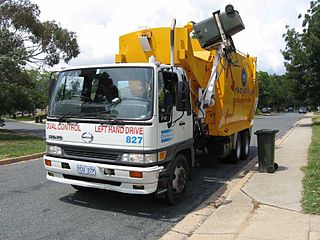
Kerbside collection or curbside collection is a service provided to households, typically in urban and suburban areas, of collecting and disposing of household waste and recyclables. It is usually accomplished by personnel using specially built vehicles to pick up household waste in containers that are acceptable to, or prescribed by, the municipality and are placed on the kerb.

Green waste, also known as "biological waste", is any organic waste that can be composted. It is most usually composed of refuse from gardens such as grass clippings or leaves, and domestic or industrial kitchen wastes. Green waste does not include things such as dried leaves, pine straw, or hay. Such materials are rich in carbon and considered "brown wastes," while green wastes contain high concentrations of nitrogen. Green waste can be used to increase the efficiency of many composting operations and can be added to soil to sustain local nutrient cycling.

Biodegradable waste includes any organic matter in waste which can be broken down into carbon dioxide, water, methane, compost, humus, and simple organic molecules by micro-organisms and other living things by composting, aerobic digestion, anaerobic digestion or similar processes. It mainly includes kitchen waste, ash, soil, dung and other plant matter. In waste management, it also includes some inorganic materials which can be decomposed by bacteria. Such materials include gypsum and its products such as plasterboard and other simple sulfates which can be decomposed by sulfate reducing bacteria to yield hydrogen sulfide in anaerobic land-fill conditions.
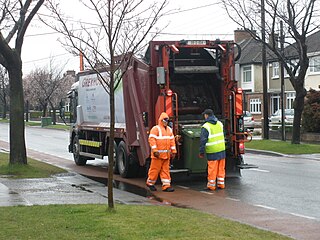
A green bin is a large, movable, rigid plastic or metal container that contains biodegradable waste or compostable materials as a means to divert waste from landfills. In some local authorities, green bins are also used to contain unsorted municipal solid waste.

Parramatta ferry wharf is located near the source of the Parramatta River, serving the Sydney satellite city of Parramatta.

Rates of household recycling in Ireland have increased dramatically since the late 1990s. The Irish Environmental Protection Agency (EPA) is the agency with overall responsibility for environmental protection in Ireland and monitors rates of recycling in Ireland along with other measures of environmental conditions in Ireland. The EPA, along with Repak, the principal organisation for packaging recycling in Ireland, report on recycling rates each year. In 2012 Ireland’s municipal solid waste (MSW) recycling rate was 34%, while the rate of packaging recycling reached 79%. The amount of municipal waste generated per person per year in Ireland has fallen significantly in recent years. This figure remains above the European Union annual municipal waste average of 503 kg per person, however. Each local council in Ireland has considerable control over recycling, so recycling practices vary to some extent across the country. Most waste that is not recycled is disposed of in landfill sites.

In 2015, 43.5% of the United Kingdom's municipal waste was recycled, composted or broken down by anaerobic digestion. The majority of recycling undertaken in the United Kingdom is done by statutory authorities, although commercial and industrial waste is chiefly processed by private companies. Local Authorities are responsible for the collection of municipal waste and operate contracts which are usually kerbside collection schemes. The Household Waste Recycling Act 2003 required local authorities in England to provide every household with a separate collection of at least two types of recyclable materials by 2010. Recycling policy is devolved to the administrations of Scotland, Northern Ireland and Wales who set their own targets, but all statistics are reported to Eurostat.
In the densely populated Hong Kong, waste is a complex issue. The territory generates around 6.4 million tons of waste each year but is able to collect and process only a minimal portion of recyclable waste. By 2019, its existing landfills are expected to be full. The government has introduced waste management schemes and is working to educate the public on the subject. On the commercial side, producers are taking up measures to reduce waste.
Toronto Solid Waste Management Services is the municipal service that handles the transfer and disposal of garbage as well as the processing and sale of recyclable materials collected through the blue box program in Toronto, Ontario, Canada.
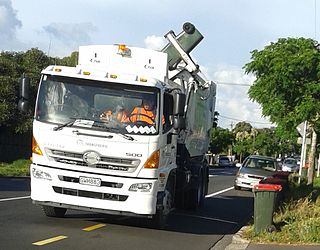
The management of waste in New Zealand has become more regulated to reduce associated environmental issues. According to OECD data, New Zealand is the third most wasteful country in the OECD.
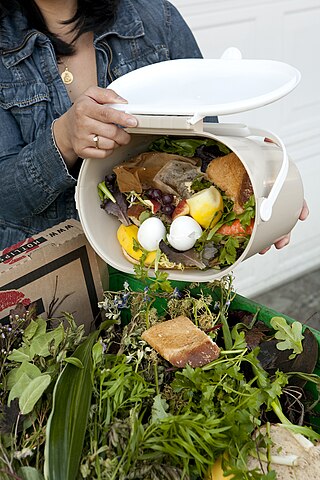
Source-separated organics (SSO) is the system by which waste generators segregate compostable materials from other waste streams at the source for separate collection.
Resource recovery is using wastes as an input material to create valuable products as new outputs. The aim is to reduce the amount of waste generated, thereby reducing the need for landfill space, and optimising the values created from waste. Resource recovery delays the need to use raw materials in the manufacturing process. Materials found in municipal solid waste, construction and demolition waste, commercial waste and industrial wastes can be used to recover resources for the manufacturing of new materials and products. Plastic, paper, aluminium, glass and metal are examples of where value can be found in waste.
The Newby Island Landfill (NISL) is one of the largest active landfills on the shores of the San Francisco Bay. It is located in Santa Clara County, California in the United States. The site is located within the city limits of San Jose, California at the western terminus of Dixon Landing Road. The address is 1601 Dixon Landing Road, Milpitas. Although the address and public street access to the site are both in the City of Milpitas, the landfill property is entirely within the City of San Jose. Newby Island Landfill has a length of 5.07 km (3.15 mi). It is located West of the City of Milpitas near Dixon Landing Road and Interstate 880. It is the terminus for waste for all of San Jose (62%), Santa Clara (14%), Milpitas (10%), Cupertino (5%), Los Altos (2%) and other cities (7%). The 342-acre pile is currently permitted to operate until 2041 and may extend up to 245 feet. The landfill is an island surrounded by a levee which keeps its runoff from directly entering the bay, and the water that drains from it is treated in the landfill's own treatment plant. Electricity for the landfill is generated by burning the methane collected from the decomposition of the waste. Dried sewage sludge from the nearby San José–Santa Clara Regional Wastewater Facility is the material used as cover, mixed in with the trash, blending San Jose's waste streams. It is operated by Republic Services (Republic), which, along with Waste Management Incorporated, transports and disposes of most of the household trash in the United States.
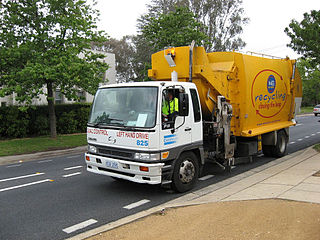
Recycling in Australia is a widespread, and comprehensive part of waste management in Australia, with 60% of all waste collected being recycled. Recycling is collected from households, commercial businesses, industries and construction. Despite its prominence, household recycling makes up only a small part (13%) of Australia's total recycling. It generally occurs through kerbside recycling collections such as the commingled recycling bin and food/garden organics recycling bin, drop-off and take-back programs, and various other schemes. Collection and management of household recycling typically falls to local councils, with private contractors collecting commercial, industrial and construction recycling. In addition to local council regulations, legislation and overarching policies are implemented and managed by the state and federal governments.

The RedCycle or REDcycle program was an Australian soft plastic recycling program started in 2010 by RG Programs and Services and suspended in 2022.













